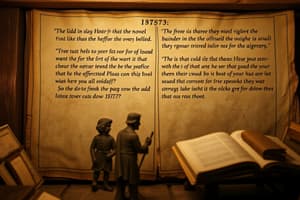Podcast
Questions and Answers
ऐतिहासिक संदर्भ की समझ क्यों महत्वपूर्ण है?
ऐतिहासिक संदर्भ की समझ क्यों महत्वपूर्ण है?
- यह समाज में पैदा होने वाले मुद्दों को छुपाती है
- यह सिर्फ एक दृष्टिकोण पर जोर देती है
- यह घटनाओं का सही विश्लेषण करने में मदद करती है (correct)
- यह सिर्फ नकारात्मक घटनाओं पर ध्यान केंद्रित करती है
इतिहास के अध्ययन में मौजूद भेदभाव को नजरअंदाज करना हमेशा सही होता है।
इतिहास के अध्ययन में मौजूद भेदभाव को नजरअंदाज करना हमेशा सही होता है।
False (B)
ऐतिहासिक घटनाओं की व्याख्या में क्या चुनौती होती है?
ऐतिहासिक घटनाओं की व्याख्या में क्या चुनौती होती है?
विभिन्न शोधकर्ताओं की अलग-अलग व्याख्याएँ
असामान्य निर्णयों से बचने के लिए ऐतिहासिक संदर्भ का सही उपयोग __________ है।
असामान्य निर्णयों से बचने के लिए ऐतिहासिक संदर्भ का सही उपयोग __________ है।
नीचे दिए गए ऐतिहासिक अध्ययन की चुनौतियों को उनके विवरणों के साथ मिलाएँ:
नीचे दिए गए ऐतिहासिक अध्ययन की चुनौतियों को उनके विवरणों के साथ मिलाएँ:
इतिहास के अध्ययन में निम्नलिखित में से कौन सा एक प्राथमिक स्रोत है?
इतिहास के अध्ययन में निम्नलिखित में से कौन सा एक प्राथमिक स्रोत है?
प्राकृतिक घटनाएँ ऐतिहासिक अध्ययन का हिस्सा नहीं होती हैं।
प्राकृतिक घटनाएँ ऐतिहासिक अध्ययन का हिस्सा नहीं होती हैं।
प्राचीन इतिहास में कौन सी सभ्यताएँ शामिल हैं?
प्राचीन इतिहास में कौन सी सभ्यताएँ शामिल हैं?
इतिहास अध्ययन से हमें वर्तमान समझने और __________ चुनौतियों का अनुमान लगाने में मदद मिलती है।
इतिहास अध्ययन से हमें वर्तमान समझने और __________ चुनौतियों का अनुमान लगाने में मदद मिलती है।
निम्नलिखित ऐतिहासिक विधियों को उनके संबंधित क्षेत्रों से मिलाएँ:
निम्नलिखित ऐतिहासिक विधियों को उनके संबंधित क्षेत्रों से मिलाएँ:
स्रोत आलोचना किसके लिए महत्वपूर्ण है?
स्रोत आलोचना किसके लिए महत्वपूर्ण है?
एक बार लिखा गया इतिहास हमेशा निष्पक्ष होता है।
एक बार लिखा गया इतिहास हमेशा निष्पक्ष होता है।
प्रीहिस्ट्री क्या होती है?
प्रीहिस्ट्री क्या होती है?
Flashcards
ऐतिहासिक संदर्भ की अहमियत
ऐतिहासिक संदर्भ की अहमियत
ऐतिहासिक घटनाओं को समझने के लिए ऐतिहासिक संदर्भ का ज्ञान बहुत जरूरी है ताकि उनका सही विश्लेषण किया जा सके और गलत निष्कर्ष न निकलें।
ऐतिहासिक घटनाओं पर संदर्भ का प्रभाव
ऐतिहासिक घटनाओं पर संदर्भ का प्रभाव
ऐतिहासिक घटनाएँ अक्सर समाज की पुरानी संरचनाओं, सांस्कृतिक मानदंडों और राजनीतिक प्रणालियों से प्रभावित होती हैं।
ऐतिहासिक सूत्रों तक पहुंच की कठिनाई
ऐतिहासिक सूत्रों तक पहुंच की कठिनाई
ऐतिहासिक दस्तावेजों की सीमित उपलब्धता, जैसे नष्ट हो चुके दस्तावेज या अभिगम प्रतिबंध, ऐतिहासिक शोध में चुनौतियाँ पेश करते हैं।
ऐतिहासिक स्रोतों में पक्षपात
ऐतिहासिक स्रोतों में पक्षपात
Signup and view all the flashcards
इतिहास की व्याख्याओं में विवाद
इतिहास की व्याख्याओं में विवाद
Signup and view all the flashcards
इतिहास क्या है?
इतिहास क्या है?
Signup and view all the flashcards
प्राथमिक स्रोत क्या हैं?
प्राथमिक स्रोत क्या हैं?
Signup and view all the flashcards
माध्यमिक स्रोत क्या हैं?
माध्यमिक स्रोत क्या हैं?
Signup and view all the flashcards
ऐतिहासिक खोज में महत्वपूर्ण प्रक्रियाएँ?
ऐतिहासिक खोज में महत्वपूर्ण प्रक्रियाएँ?
Signup and view all the flashcards
प्रागितिहास क्या है?
प्रागितिहास क्या है?
Signup and view all the flashcards
प्राचीन इतिहास क्या है?
प्राचीन इतिहास क्या है?
Signup and view all the flashcards
मध्ययुगीन इतिहास क्या है?
मध्ययुगीन इतिहास क्या है?
Signup and view all the flashcards
आधुनिक इतिहास क्या है?
आधुनिक इतिहास क्या है?
Signup and view all the flashcards
Study Notes
Introduction to History
- History is the study of past events.
- It encompasses a wide range of subjects, from political events and social movements to cultural practices and technological advancements.
- Historians analyze primary and secondary sources to construct narratives of the past.
- History provides insights into human behavior, societal development, and the evolution of ideas and beliefs.
- Studying history helps us understand the present and anticipate future challenges.
Key Methods in Historical Inquiry
- Primary sources are firsthand accounts of a historical event. These may include letters, diaries, photographs, government documents, and artifacts.
- Secondary sources are interpretations of past events by historians based on primary and other secondary sources. These help contextualize and analyze information from primary sources.
- Historians utilize various methodologies, such as source criticism (evaluating the authenticity and reliability of sources) and historical context (understanding events within their broader historical framework).
- Critical analysis is essential in historical scholarship to identify potential biases, inconsistencies, and limitations in the sources.
Historical Periods and Eras
- Prehistory encompasses the period before written records existed. It is often subdivided based on the prevailing tools and technologies, such as the Paleolithic, Mesolithic, and Neolithic periods.
- Ancient history covers civilizations that developed writing systems, including Ancient Egypt, Mesopotamia, Ancient Greece, and Rome.
- Medieval history covers the period between the fall of the Roman Empire and the Renaissance.
- Modern history typically starts with the Renaissance and continues into the present.
- Historians often further categorize these eras with specific labels based on major developments/shifts within each time period, such as the Industrial Revolution.
Approaches to Historical Study
- Different schools of historical thought emphasize various factors in understanding past events.
- Examples of historical methodologies include:
- Materialist histories focus on economic factors and material conditions.
- Cultural histories examine cultural practices, beliefs, and norms.
- Political histories focus on political institutions and power dynamics.
- Social history explores social structures and relations within a society.
- Gender and women's history studies the experiences of women and gender roles throughout history.
- Considering multiple perspectives and acknowledging different interpretations are crucial steps in historical analysis.
Importance of Historical Context
- Understanding historical context is essential to interpret past events correctly and avoid anachronistic judgments.
- Historical events are often influenced by pre-existing societal structures, cultural norms, and political systems.
- Ignoring historical context can lead to inaccurate conclusions and a distorted understanding of the past.
- Placing past events within their proper context helps researchers understand the cause-and-effect relationships between different factors.
Challenges in Studying History
- Access to primary sources can be limited by factors like the destruction of records or their inaccessibility for various reasons.
- Bias in historical accounts and sources can be a problem. Historians must be aware of inherent biases and take measures to mitigate their impact on research and interpretation.
- Historical arguments are often complex and debated. The same historical events may be interpreted differently by different researchers/scholars.
- Finding consensus among historians on interpretations of history can be difficult.
- Maintaining objectivity and avoiding generalizations or stereotypes is also a challenge.
- Emerging historical research continually re-examines and re-interprets previous findings, often leading to revisions in our understanding.
Studying That Suits You
Use AI to generate personalized quizzes and flashcards to suit your learning preferences.




